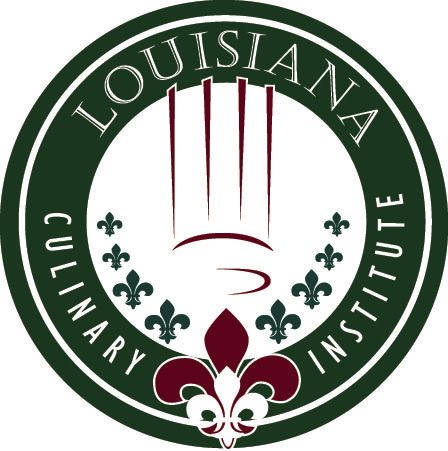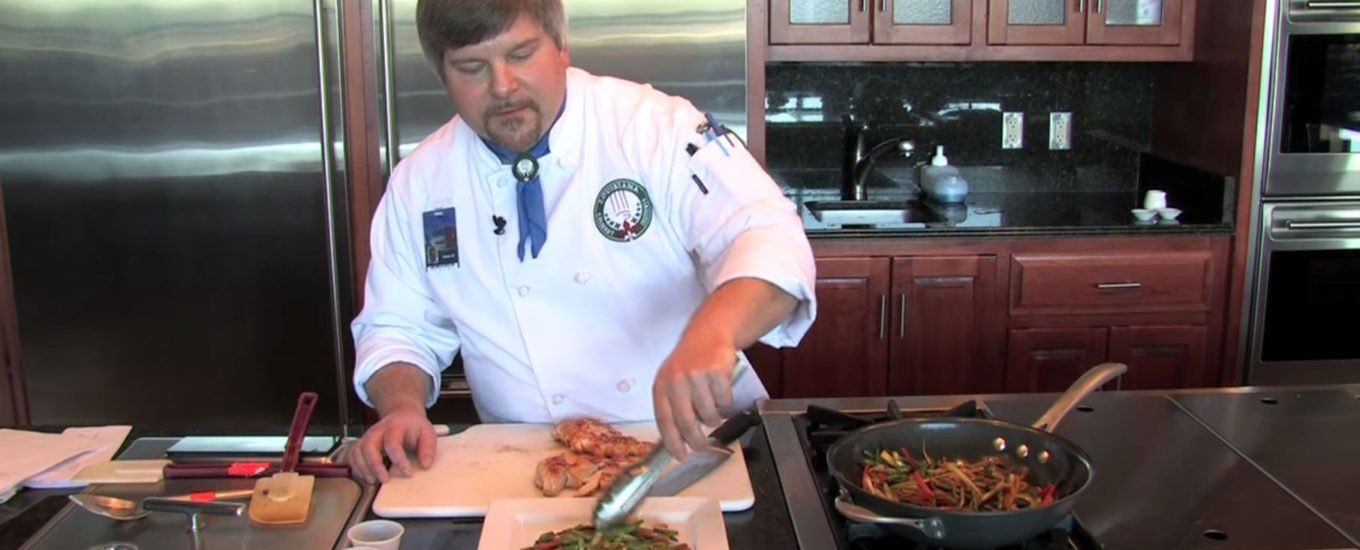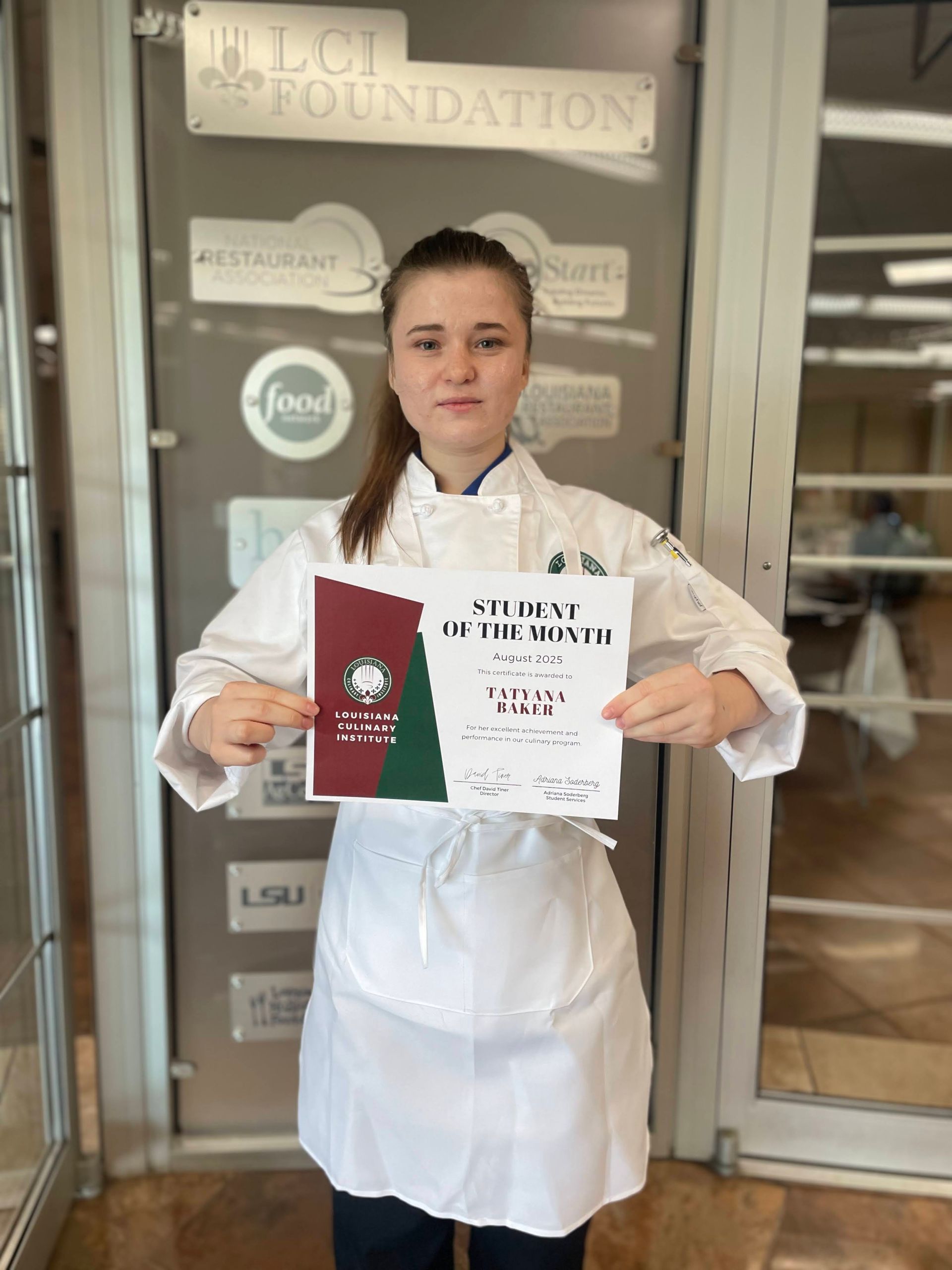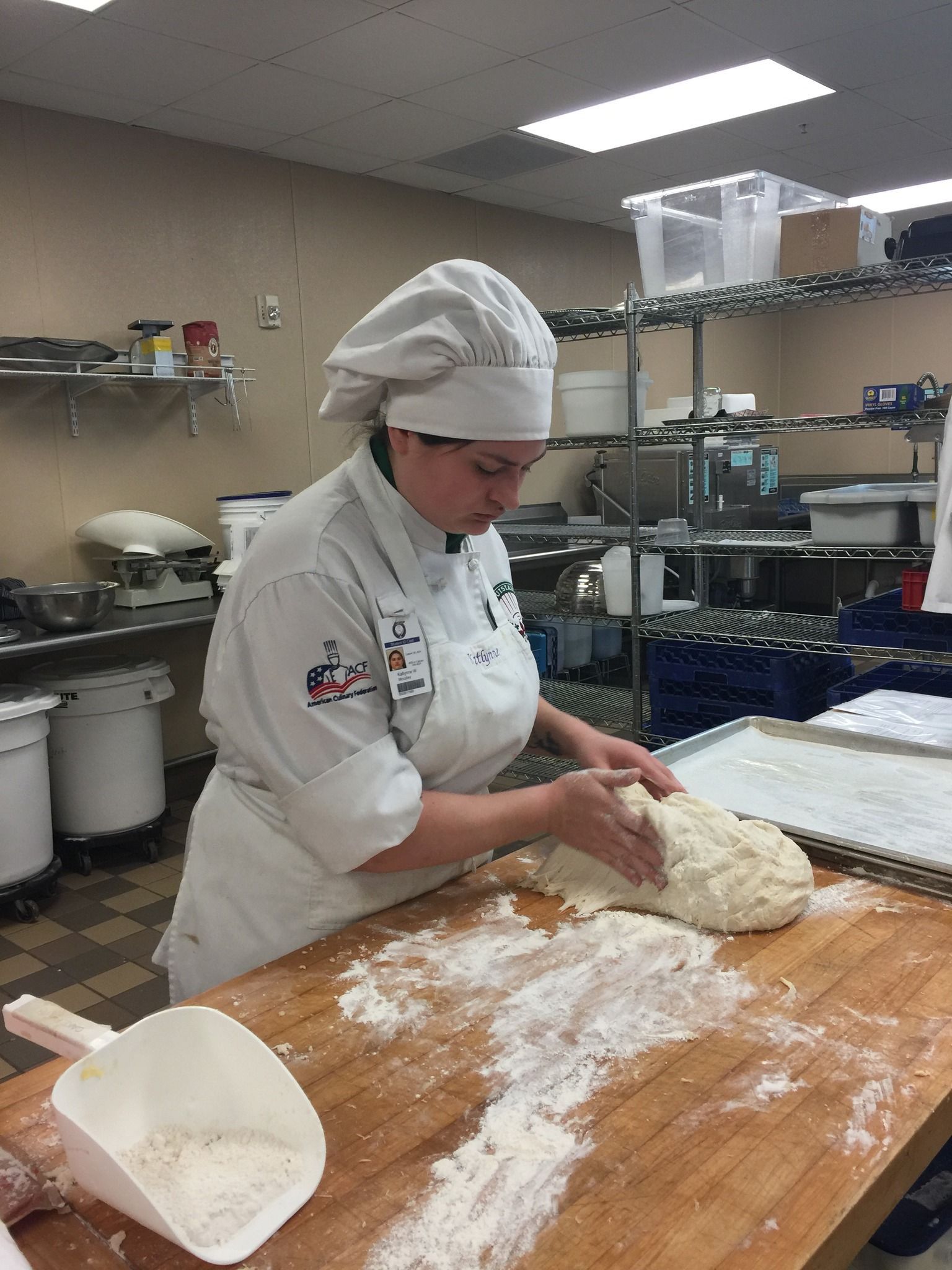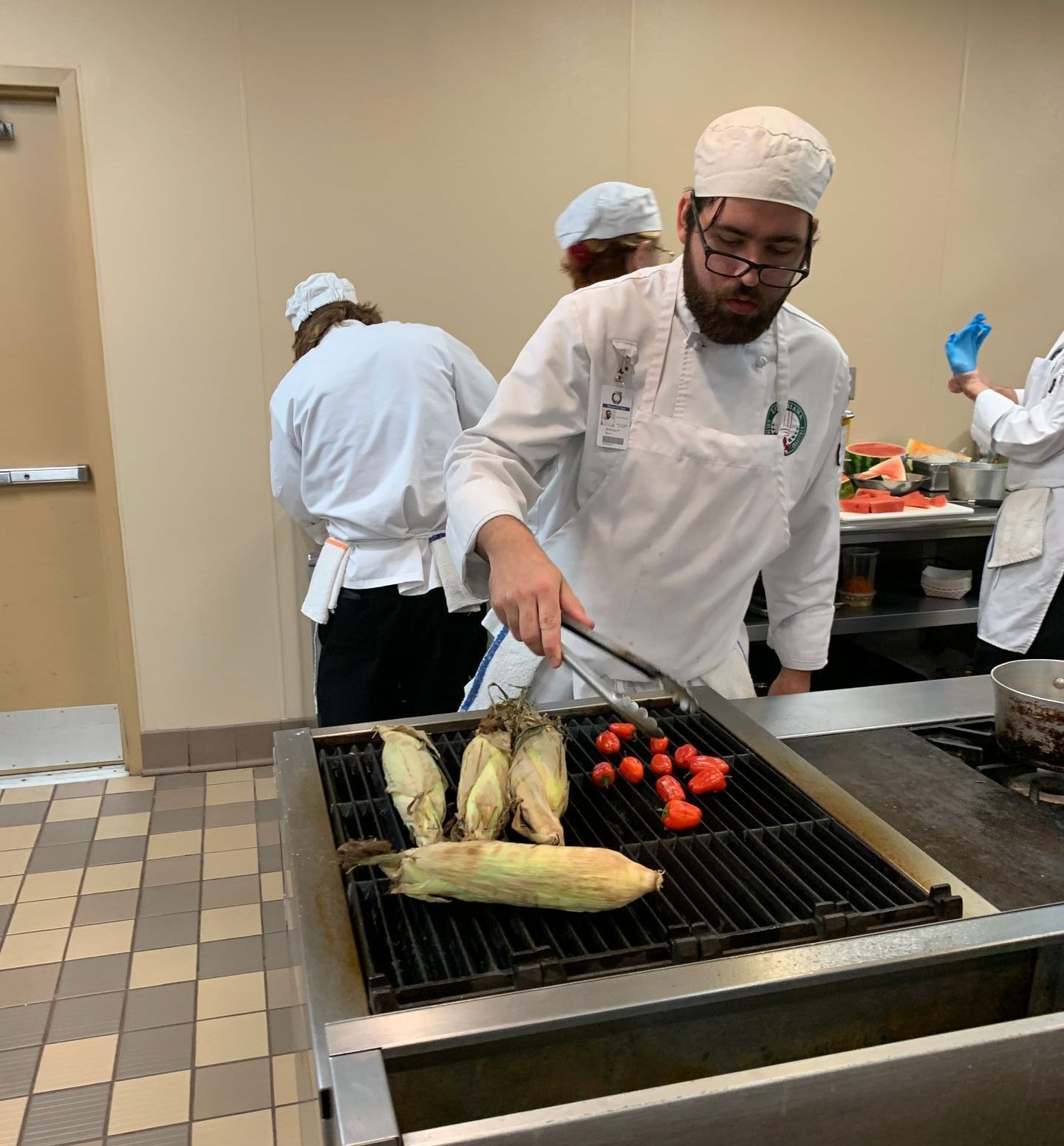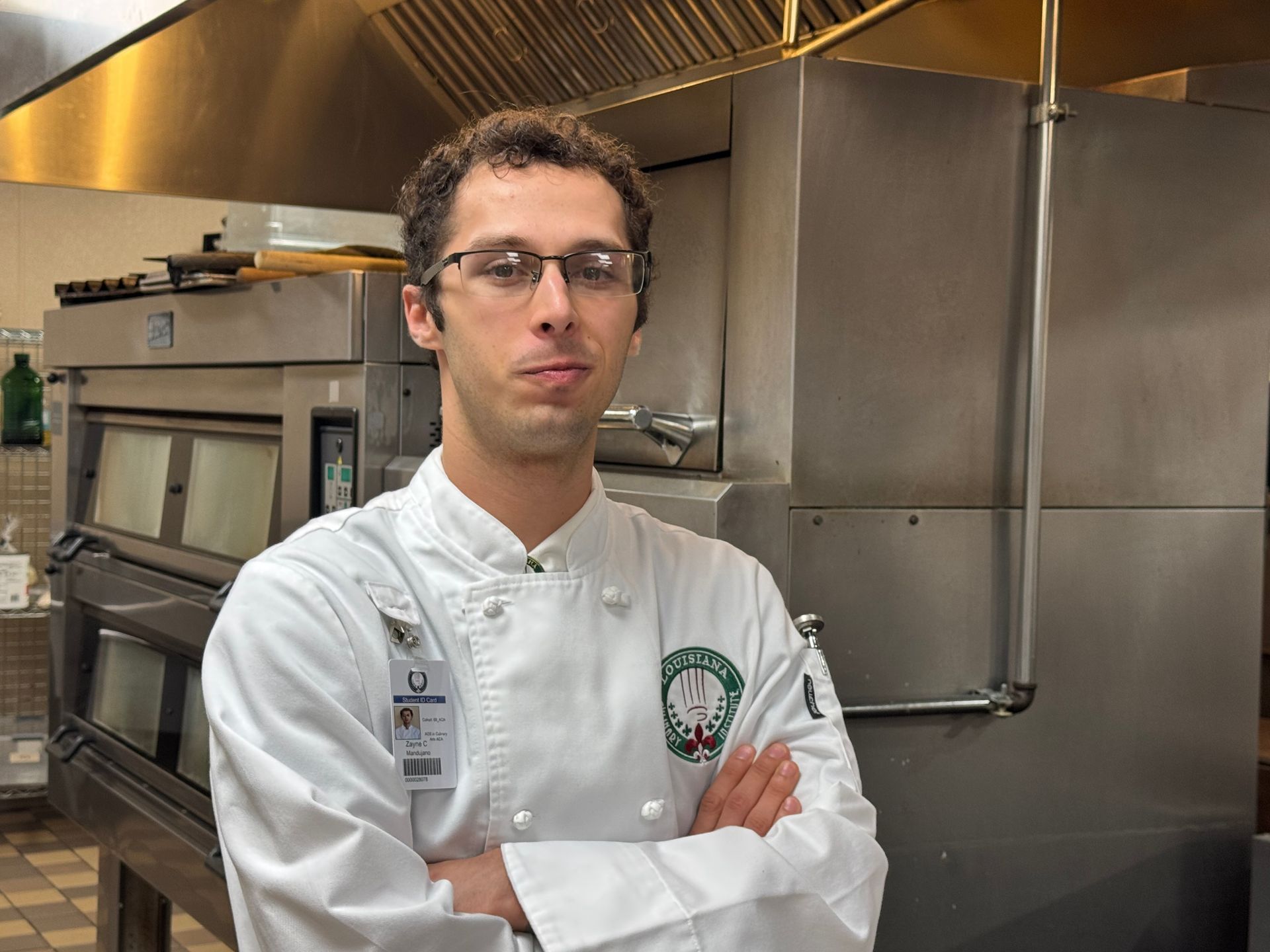AOS in Culinary Arts - Advanced Culinary Arts
Take the First Step in Following your Culinary Dreams.
OVERVIEW
Culinary school offers a unique opportunity to craft the skills and techniques that professional chefs require. It also provides the knowledge and resources necessary to launch a successful career. These elements combined with the experiences and relationships that develop throughout your education process create a truly unique educational opportunity. Here is everything you need to know about pursuing a degree in advanced culinary arts.
Classes are held Monday through Thursday, from 8:00 am to 1:45 pm. This is 5 hours per day, 4 days per week for a weekly total of 20 hours (excluding 45 minutes per day for lunch). Additionally, students who do not have transfer credits for appropriate General Education classes will have class every Monday, Tuesday and Wednesday from 2:00 pm to 2:50 pm (for the first 3 semesters). These students will experience a weekly total of 23 hours (excluding 45 minutes per day for lunch).
Advanced Culinary Arts Program Blogs
Advanced Culinary Arts Program Video
COURSE DESCRIPTIONS
First Semester (White Level)
CA 111-ServSafe® Food Safety and Sanitation (30 Lecture Clock Hours/ 2 Semester Credit Hours)
Instruction on the basic principles of sanitation and sanitary requirements following a HACCP program in receiving, storing, pre-preparation, cooking and handling foods in a commercial kitchen. Special emphasis is given to time, temperature control, cross contamination , and personal hygiene. This is the National Restaurant Association Educational Foundation’s (NRAEF) nationally recognized ServSafe® Course and is a Core Credential for the NRAEF ManageFirst Program®. Students are eligible to take the NRAEF certification test upon completion of this course to obtain the ServSafe® Sanitation Certification which is valid for five years. Cross Listed with HCM 111.
CA 101-Professional Cooking I (30 Lecture Clock Hours / 2 Semester Credit Hours)
Introduction to the history of French Classic Haute Cuisine teaching the fundamentals of professional cooking techniques using moist and dry methods in a commercial food service facility. Students are introduced to basic nutrition and are taught how to incorporate proper nutrition into their dishes. Students are also introduced to the fundamentals of recipe writing and interpretation, as well as the different types of menus used in commercial food service. The student learns how to properly utilize commercial food equipment in a safe and sanitary manner. Pre-preparation techniques are covered with an emphasis on the proper use and handling of kitchen knives.
CA 121–Restaurant Production and Service I (30 Lab Clock Hours/ I Semester Credit Hour)
Introduction to the commercial kitchen including how to use and work with equipment to practice their pre-preparation techniques in learning mise en place. This kitchen laboratory emphasizes proper pre-preparation methods and mise en place. Students are taught how to prep food items for proper cooking and are shown the proper techniques for using all commercial kitchen equipment safely. Proper use of knives is demonstrated with ample time allowed for the students to practice knife cutting techniques.
CA 109–Bread Basics (30 Lab Clock Hours/ I Semester Credit Hour)
Basic bread production including lean, rich, and laminated breads to gain an understanding of working with breads through study and manipulative skills.
CA 102-Professional Cooking II (60 Lecture Clock Hours/ 4 Semester Credit Hours)
Introduction to the use and production of stocks, sauces and soups including the fundamentals of stock making and specific techniques. Students will understand how to produce the five lead sauces using the stocks produced along with the production of clear, thick and national soups.
CA 104-Professional Cooking IV (60 Lecture Clock Hours/ 4 Semester Credit Hours)
Students will learn the basics of vegetable and starch cookery. Students will learn to identify, handle, process and cook commonly used vegetables, starches, legumes, grains and pasta along with how to control texture, flavor, color changes and nutrient losses. Students will also learn the dynamics of vegetarian diets and how to plan nutritious vegetarian menus.
CA 103-Professional Cooking III (60 Lab Clock Hours/ 2 Semester Credit Hours)
Students will learn the basics of meat, poultry and seafood cookery. Students will identify the primal cuts of beef, lamb, veal and pork and list the fabricated cuts from each of them. The composition and structure of meat is described in terms of the relationship of the proper cooking techniques used in its cooking. Students are taught the proper handling and cooking of poultry, utilizing both dry and moist heat cooking methods and an emphasis on the correct procedure used for the “slow-roasting” of large birds.
OR
CA 110-Introduction to Baking and Pastry (60 Lab Clock Hours/ 2 Semester Credit Hours)
Students are taught the fundamentals of bakeshop principles and how they are applied in cakes, pastries, cookies, ice creams, sorbets and pie production in a commercial bakery.
MAT 101-Essentials of Math (Mathematics) (45 Lecture Clock Hours/ 3 Semester Credit Hours)
This course encompasses the basics of practical math offering a comprehensive introduction to the concepts and applications of mathematics utilizing skill building modules which prepare students with the skills and competencies that they will need to enter the workforce.
2nd Semester (Blue Level)
CA 103-Professional Cooking III (60 Lab Clock Hours/ 2 Semester Credit Hours)
Students learn the basics of meat, poultry and seafood cookery. The students learn to identify the primal cuts of beef, lamb, veal and pork and list the fabricated cuts from each of them. The composition and structure of meat is described in terms of the relationship of the proper cooking techniques used in its cooking. Students are taught the proper handling and cooking of poultry, utilizing both dry and moist heat cooking methods with emphasis of the correct procedure used for the “slow-roasting” of large birds.
OR
CA 110-Introduction to Baking and Pastry (60 Lab Clock Hour s/ 2 Semester Credit Hours)
Fundamentals of the commercial kitchen bakeshop. Students are taught the fundamentals of bakeshop principles and how they are applied in cakes, pastries, cookies, ice creams, sorbets and pie production in a commercial bakery.
CA 122-Restaurant Production II (30 Lab Clock Hours/ l Semester Credit Hour)
Designed for students to practice proper cooking techniques in commercial food service. Students are given an extensive review of cooking techniques and procedures, measurements, knife skills and mise en place and are required to prepare and serve examples of each technique and procedure on meats, poultry, seafood, vegetables and starches for the faculty/staff/student meal service.
CA 132-Restaurant Service II (30 Lab Clock Hours/ 1 Semester Credit Hour)
Designed for students to practice proper serving techniques in commercial food service. Students will learn proper serving techniques and wait staff service management. At the end of this course.
CA 105-Professional Cooking V (30 Lecture Clock Hours/ 2 Semester Credit Hours)
Students will learn the basics of salads, sandwiches, and hors d‘ oeuvres cookery, as well as the basics of hot and cold food presentation and garnish. Students will be introduced to the types of salads produced in food service and their preparation techniques. Techniques for the production of different types of sandwiches are demonstrated as well as the preparation and proper production of hors d‘oeuvres. Students are also taught the importance of presenting food attractively and are taught techniques using the balance of color, shape and texture. Students are also taught how to make and use garnishes for use in presenting food more attractively.
CA 106- Professional Cooking VI (30 Lecture Clock Hours/ 2 Semester Credit Hours)
Students will learn the basics of breakfast cookery, dairy products and breakfast beverages with a focus on the many types of egg production, breakfast breads and breakfast meats. Students will also learn the various types and production of dairy products including an introduction to cheeses, proper coffee and tea service.
CA 143-Restaurant Production III (60 Lab Clock Hours/ 2 Semester Credit Hour)
Students practice their cooking techniques in preparing and serving menu courses for the faculty/staff/student meal service. The emphasis in this kitchen laboratory is for students to hone their cooking skills in preparing meats, poultry, seafood, vegetables and starches utilizing both moist and dry heat cooking methods appropriately.
CA 211- Introduction to Hospitality and Restaurant Management (30 Lecture Hours/ 2 Semester Credit Hours)
This course is designed as an overview and introduction to the hospitality and restaurant management industry, with a specific focus on leadership and management techniques. At the end of this course, students take the National Restaurant Educational Foundation’s (NRAEF) ManageFirst® test.
CA 112-Catering and Volume Food Service (30 Lecture Clock Hours/ 2 Semester Credit Hours)
Introductory course on catering for food service and hospitality managers with sound guidelines and a practical approach to operating and managing a catering business. The course includes the guidelines on how to do on and off premise catering, hire and manage catering personnel, writing a contract, sanitation, set up a kitchen, set up and use service equipment, conduct special events and kosher catering along with wine and bar service, menu making and food presentation . Cross Listed with HCM 112.
ENG 101-English Composition (Humanities) (45 Lecture Clock Hours/ 3 Semester Credit Hours)
Basic course on English grammar and composition designed to provide students with a detailed, structured approach to composition using the three steps of the writing process: prewriting, writing and rewriting. This course includes a review of grammar, offers opportunities for general and career-focused writing, and encourages improvement through addressing the writer’s audience and purpose by providing tools for proofreading and editing.
3rd Semester (Red Level)
CA 107-Professional Cooking VII (30 Lecture Clock Hours and 30 Lab Clock Hours/ 3 Semester Credit Hours)
Fundamentals of chacuterie and classic cold food production. Students will learn to prepare dry-cured and brine-cured foods, cold and hot smoked foods, and fresh, cured and smoked sausages. This course also includes an introduction to the techniques used in making classic chaud-froid and mayonnaise chaud-froid. Students will learn how to make and use aspic for the production of pates, terrines and forcemeats, to prepare galantines and ballotines and the proper ways to handle and cook foie gras.
CA 330-International Cuisine (60 Lab Clock Hours/ 2 Semester Credit Hours)
Comprehensive course on International Cookery detailing the development of cuisines, as well as a historical background with the practice of recipes from the cookery of Europe, Africa, the Middle East, Asia, Australia, and Latin America.
CA 224-Restaurant Production IV (60 Lab Clock Hours/ 2 Semester Credit Hour)
Students continue to use their learned cooking techniques in the preparation of menu items for the faculty/staff/student meal service. This kitchen production laboratory is designed to continue practicing proper cooking methods when preparing quality food menu items with a special emphasis on more advanced recipes.
NUT 201-Nutrition (Natural or Applied Science) (30 Lecture Clock Hours/ 2 Semester Credit Hours)
Thorough overview of basic nutrition offering a detailed review of information on nutrition and diet including the latest Guidelines for Americans, My Pyramid, balanced menu options, basic principles of food presentation, meeting special dietary needs, and weight management. At the end of this course, students will take the National Restaurant Association Educational Foundation’s (NRAEF) ManageFirst® certification test.
MAT 102-Controlling Costs (Mathematics) (30 Lecture Clock Hours/ 2 Semester Credit Hours)
This course focuses on the mathematics and decision-making required to control the costs within the foodservice industry. Topics include accounting and profitability, as well as other necessary components needed to effectively and successfully manage a restaurant.
CA 334-Molecular Gastronomy (30 Lecture Clock Hours/ 2 Semester Credit Hours)
Fundamental food science concepts that transform tastes, nutritional values, and textures of foods into an innovative and new dining experience. Instructor–led and hands-on demonstrations will emphasize the chemical, physical, and biological changes to food during processing and storage.
CA 333-Advanced International Cuisine (30 Lab Clock Hours/ 1 Semester Credit Hour)
Explore cuisines of countries not covered in CA 330 – International Cuisine. Students will be provided with an explanation of the development of cuisines, as well as a historical background and recipes from the cookery of Asia.
PSY 201-Psychology for Leadership (Behavioral Science) (45 Lecture Clock Hours/ 3 Semester Credit Hours)
A study of the psychology used by leaders and managers in the business world. This course covers the many aspects of psychology needed by leaders and managers in today‘ s businesses in order to manage personnel more effectively. The course subjects include psychology for successful leading, forging a common direction, working together, making use of problems and barriers, and becoming leaders
4th Semester (Green Level)
CA 225-Restaurant Production V (60 Lab Clock Hours/ 2 Semester Credit Hour)
Students will learn “ A La Carte“ production techniques and procedures used in full service restaurants while cooking food menu courses for the faculty/staff/student meal service.
CA 311-Wine Fundamentals (30 Lecture Hours / 2 Semester Credit Hours)
Thorough introductory course on wine which will present students with the practical and detailed knowledge necessary to manage wine and wine sales. This course encompasses the basics of wine, the wine regions of the world, types of wine and the business of wine. Cross Listed with HCM 311.
LS 200–Career Management (Humanities) (30 Lecture Clock Hours/ 2 Semester Credit Hours)
An overview of skills learned in previous courses relating to achieving success in the workplace. Specific topics include transforming personal interests into professional goals; searching for, securing, and maintaining employment ; seeking out and obtaining networking opportunities; and professional development.
CA 331-American Regional Cuisine (60 Lab Clock Hours/ 2 Semester Credit Hours)
A comprehensive course on American Regional Cuisine, focusing on the diversity, distinction and essence of the eleven regional culinary traditions of the United States. This course includes history, techniques, and procedures used within each region. Recipes are drawn from every part of the menu, offering a range of complete meals for each culinary style.
CA 332-Cajun and Creole Cuisine (60 Lab Clock Hours/2 Semester Credit Hours)
An intense course on Cajun and Creole Cuisine encompassing the centuries of history and unique blending of the nations and cultures that make up the cuisine of Louisiana. The history and culture are accompanied by thorough instruction on the various techniques and procedures used in this cuisine and within specific recipes and food products from Louisiana.
CA 226-Restaurant Production VI (60 Lab Clock Hours/ 2 Semester Credit Hour)
Use of a la carte production techniques while focusing on managing the kitchen to produce the faculty/staff/student meal.
